一般过去时与现在完成时区别专题与练习
英语易错锦囊专题04 动词的时态和语态易错点典例分析_点评_巩固
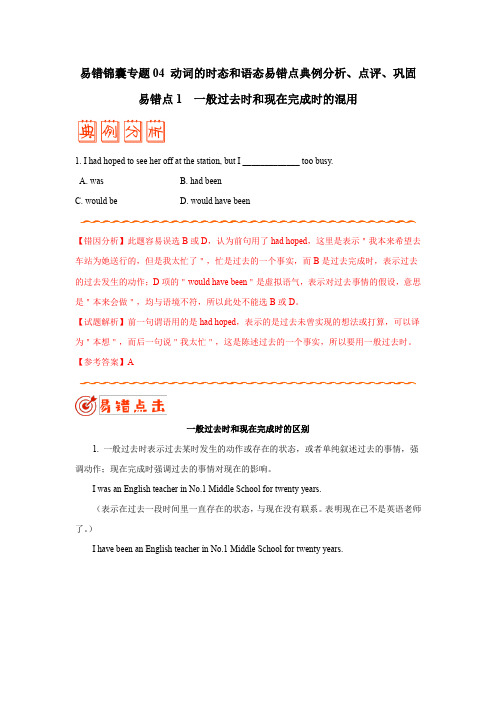
易错锦囊专题04 动词的时态和语态易错点典例分析、点评、巩固易错点1 一般过去时和现在完成时的混用1. I had hoped to see her off at the station, but I _____________ too busy.A. wasB. had beenC. would beD. would have been【错因分析】此题容易误选B或D,认为前句用了had hoped,这里是表示"我本来希望去车站为她送行的,但是我太忙了",忙是过去的一个事实,而B是过去完成时,表示过去的过去发生的动作;D项的"would have been"是虚拟语气,表示对过去事情的假设,意思是"本来会做",均与语境不符,所以此处不能选B或D。
【试题解析】前一句谓语用的是had hoped,表示的是过去未曾实现的想法或打算,可以译为"本想",而后一句说"我太忙",这是陈述过去的一个事实,所以要用一般过去时。
【参考答案】A一般过去时和现在完成时的区别1. 一般过去时表示过去某时发生的动作或存在的状态,或者单纯叙述过去的事情,强调动作;现在完成时强调过去的事情对现在的影响。
I was an English teacher in No.1 Middle School for twenty years.(表示在过去一段时间里一直存在的状态,与现在没有联系。
表明现在已不是英语老师了。
)I have been an English teacher in No.1 Middle School for twenty years.(表明截止到现在在第一中学已任教二十年了,与现在有联系。
)2. 一般过去时常与具体的时间状语连用,而现在完成时通常与模糊的时间状语连用或无时间状语。
He wrote many plays when he was at college.(有明确的表示过去的时间状语,表示写剧本是他过去做的事情。
一般过去时与现在完成时区别专题与练习
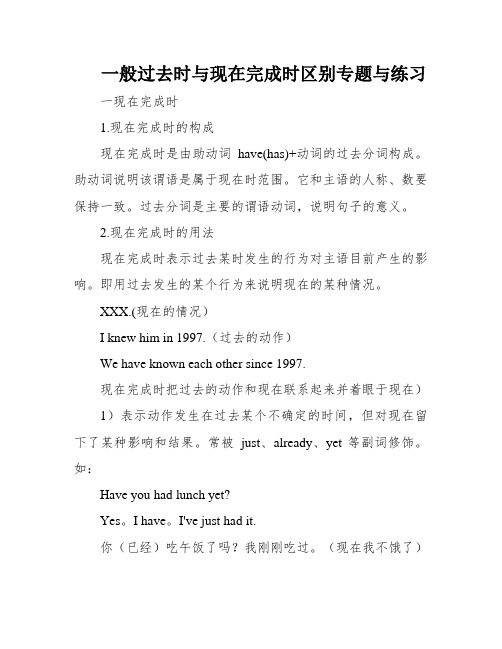
一般过去时与现在完成时区别专题与练习一现在完成时1.现在完成时的构成现在完成时是由助动词have(has)+动词的过去分词构成。
助动词说明该谓语是属于现在时范围。
它和主语的人称、数要保持一致。
过去分词是主要的谓语动词,说明句子的意义。
2.现在完成时的用法现在完成时表示过去某时发生的行为对主语目前产生的影响。
即用过去发生的某个行为来说明现在的某种情况。
XXX.(现在的情况)I knew him in 1997.(过去的动作)We have known each other since 1997.现在完成时把过去的动作和现在联系起来并着眼于现在)1)表示动作发生在过去某个不确定的时间,但对现在留下了某种影响和结果。
常被just、already、yet等副词修饰。
如:Have you had lunch yet?Yes。
I have。
I've just had it.你(已经)吃午饭了吗?我刚刚吃过。
(现在我不饿了)2)透露表现从曩昔某一时辰入手下手一向连续到目前的举措或状况。
这个举措大概刚截止,大概仍旧在举行。
常带有for和since等透露表现一段工夫的状语。
如:He has taught here since 1981他自1981年就在这儿教书。
(大概还要连续教)I XXX her for four years.我有四年没见到她了。
3)表示说话前发生过一次或多次的动作,现在成为一种经验,一般译为汉语“过”,ice。
ever。
never。
three times等时间状语。
如:I have been to Beijing twice.我去过北京二次。
3.现在完成时的时间状语1)目前完成时属于目前时范围,故不克不及和曩昔的工夫状语连用。
如:yesterday,lastSunday,in1990,three years ago 等。
可是,在夸大举措产生的结果和影响时,能够和一些透露表现不肯定的工夫状语连用。
浙江省中考英语总复习 第2部分 语法专题复习篇 第34课时 动词的时态(精讲)试题 外研版-外研版初

第34课时动词的时态动词的时态是中考考查的重点内容,初中阶段涉及了以下八种时态:一般现在时、一般过去时、一般将来时、现在进行时、过去进行时、现在完成时、过去将来时、过去完成时,其中前六种是常用时态,要求重点掌握。
对于动词的时态的考查主要涉及以下考点:1.掌握常用的六种时态的构成、用法以及标志性时间状语;2.理解过去将来时和过去完成时的用法。
一般现在时1.构成(1)be(am/is/are)+表语(名词、形容词等)(2)实义动词用原形或单三人称单数形式2.用法(1)表示经常性或习惯性的动作,常与表示频度的时间状语连用,如often,sometimes,usually,always,once/twice a week/month,every day/week/month…,on Sunday等。
如:Lucy often goes to school by bike.露西经常骑自行车去上学。
I brush my teeth twice a day.我一天刷两次牙。
(2)表示主语现在的状态、性格、身份、能力等。
如:Lily is more outgoing than Linda.莉莉比琳达更开朗。
Peter likes beef noodles.彼得喜欢牛肉面。
(3)表示客观事实、真理或用于格言警句中。
如:The earth goes around the sun.地球绕着太阳转。
Practice makes perfect.熟能生巧。
(4)某些动词如e,go,leave等,可用一般现在时(或现在进行时)表示一般将来时,这主要用来表示在时间上已确定或安排好的事情。
如:The train leaves at six tomorrow morning.火车将于明天早上六点出发。
The bus is ing soon.公交车快来了。
(现在进行时表示即将发生的动作)【即时训练】用括号内所给单词的适当形式填空。
1.Of all the mountains,Qomolangma __rises__ (rise)the highest and is the most famous.2.My father is a teacher and he __teaches__ (teach)in a middle school.3.Uncle John __goes__ for a walk after supper every day.一般过去时1.构成(1)be(was/were)+表语(名词、形容词等)(2)实义动词用动词的过去式,要注意常用不规则动词的过去式2.用法表示过去某个时间或某一段时间内发生的动作或存在的状态,常和表示过去的时间状语连用,如yesterday,the day before yesterday,last night/week/year…,an hour/two days… ago,a moment ago(=just now),in 2014,when he was very young等。
【中考英语考点详解+专项训练】专题12 动词时态(三) (原卷版)
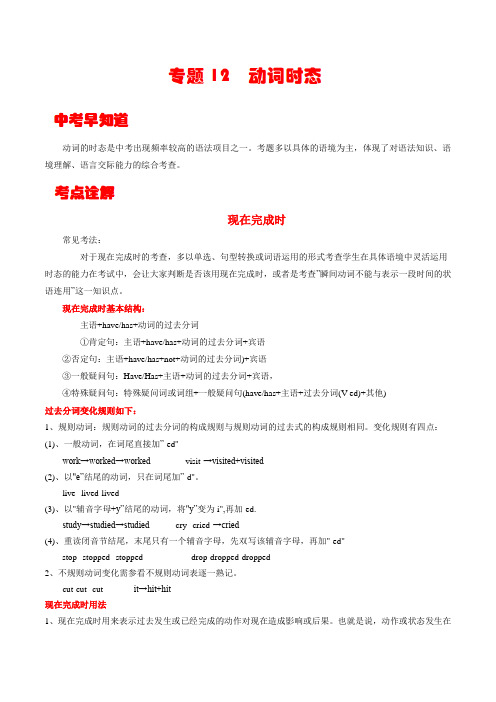
动词的时态是中考出现频率较高的语法项目之一。
考题多以具体的语境为主,体现了对语法知识、语境理解、语言交际能力的综合考查。
现在完成时常见考法:对于现在完成时的考查,多以单选、句型转换或词语运用的形式考查学生在具体语境中灵活运用时态的能力在考试中,会让大家判断是否该用现在完成时,或者是考查”瞬间动词不能与表示一段时间的状语连用”这一知识点。
现在完成时基本结构:主语+have/has+动词的过去分词①肯定句:主语+have/has+动词的过去分词+宾语②否定句:主语+have/has+not+动词的过去分词)+宾语③一般疑问句:Have/Has+主语+动词的过去分词+宾语,④特殊疑问句:特殊疑问词或词组+一般疑问句(have/has+主语+过去分词(V-ed)+其他)过去分词变化规则如下:1、规则动词:规则动词的过去分词的构成规则与规则动词的过去式的构成规则相同。
变化规则有四点:(1)、一般动词,在词尾直接加”-ed"work→worked→worked visit-→visited+visited(2)、以"e”结尾的动词,只在词尾加”-d"。
live--lived-lived(3)、以"辅音字母+y”结尾的动词,将"y”变为i",再加-ed.study→studied→studied cry--cried-→cried(4)、重读闭音节结尾,末尾只有一个辅音字母,先双写该辅音字母,再加"-ed"stop--stopped--stopped drop-dropped-dropped2、不规则动词变化需参看不规则动词表逐一熟记。
cut-cut--cut it→hit+hit现在完成时用法1、现在完成时用来表示过去发生或已经完成的动作对现在造成影响或后果。
也就是说,动作或状态发生在过去但它的影响现在还存在,强调的是现在。
I have already posted the photo. 我已经把照片寄走了。
初中英语8种时态复习及专题练习

初中英语8种时态复习I.时态详解一、一般现在时:概念:①表现在存在的状态;②现在经常、反复发生的动作。
时间状语:always,usually,often,sometimes,everyweek(day,year,month…),onceaweek,onSund ays,etc.基本结构:①主语+be(am,is,are);②主语+行为动词原型(单三形式主语+动词单三形式)否定形式:①am/is/are+not;(is+not=isn’t;are+not=aren’t)②此时态的谓语动词若为行为动词,则在其前加don't,如主语为第三人称单数,则用doesn't,同时还原行为动词。
一般疑问句:①把be动词放于句首;②用助动词do提问,如主语为第三人称单数,则用does,同时,还原行为动词。
二、一般过去时:概念:①过去某个时间里发生的动作或状态;②过去习惯性、经常性的动作、行为。
时间状语:ago,yesterday,thedaybeforeyesterday,lastweek(year,night,month…),in1989,jus tnow,attheageof5,oneday,longlongago,onceuponatime,etc.基本结构:①主语+be(was,were);②主语+动词过去式否定形式:①was/were+not;(was+not=wasn’t;were+not=weren’t)②在行为动词前加didn't,同时还原行为动词。
一般疑问句:①was或were放于句首;②用助动词did提问,同时还原行为动词。
三、现在进行时:概念:表示现阶段或说话时正在进行的动作及行为。
时间状语:now,look,listen,atthistime,thesedays,etc.基本结构:be(am,is,are)+doing否定形式:be(am,is,are)+not+doing.一般疑问句:把be动词放于句首。
中考动词时态语态习题
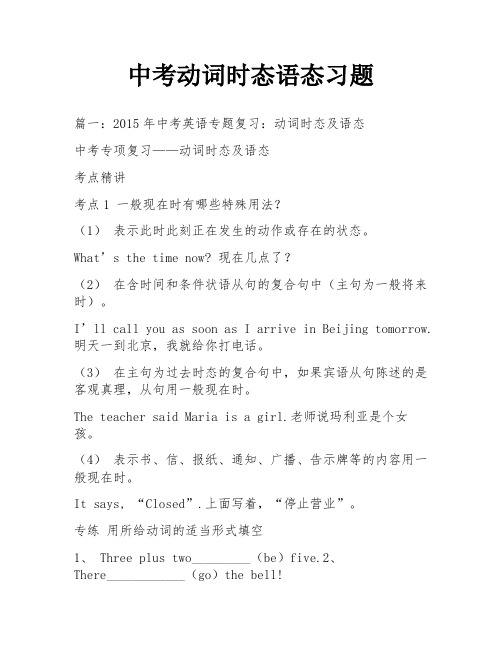
中考动词时态语态习题篇一:2015年中考英语专题复习:动词时态及语态中考专项复习——动词时态及语态考点精讲考点1 一般现在时有哪些特殊用法?(1)表示此时此刻正在发生的动作或存在的状态。
What’s the time now? 现在几点了?(2)在含时间和条件状语从句的复合句中(主句为一般将来时)。
I’ll call you as soon as I arrive in Beijing tomorrow.明天一到北京,我就给你打电话。
(3)在主句为过去时态的复合句中,如果宾语从句陈述的是客观真理,从句用一般现在时。
The teacher said Maria is a girl.老师说玛利亚是个女孩。
(4)表示书、信、报纸、通知、广播、告示牌等的内容用一般现在时。
It says, “Closed”.上面写着,“停止营业”。
专练用所给动词的适当形式填空1、 Three plus two_________(be)five.2、There____________(go)the bell!3、Light______________(travel)faster than sound.4、If you____________(ask)her tomorrow, she will help you.5、The notice _______________(say)“No Smoking!”.考点2 如何使用used to?used to后加动词原形表示“过去常常”,其疑问句和否定句可直接使用used,也可借助于did。
I used to be afraid of dark .我过去常怕黑。
He usedn’t to ride to school.他过去不常骑车去上学。
H e used to smoke, didn’t he?他过去常抽烟,是吗?注意:be used to doing 意为“习惯做某事”, be used to do 意为“被用来……”,不要混淆。
高中英语时态语态专题加练习-附答案
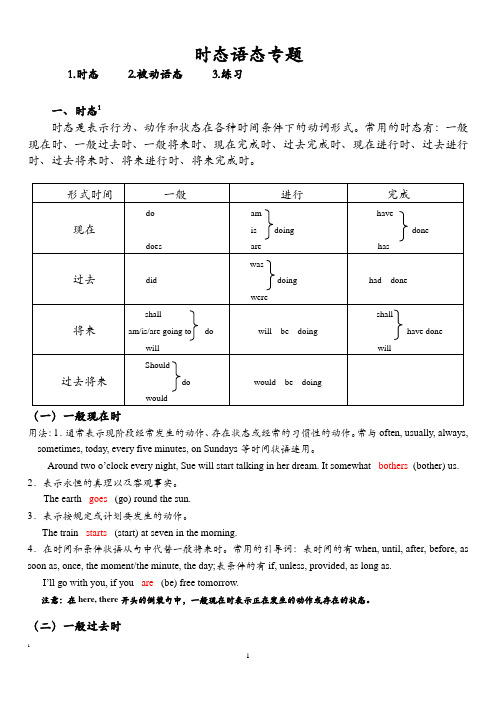
时态语态专题1.时态2.被动语态3.练习一、时态1时态是表示行为、动作和状态在各种时间条件下的动词形式。
常用的时态有:一般现在时、一般过去时、一般将来时、现在完成时、过去完成时、现在进行时、过去进行时、过去将来时、将来进行时、将来完成时。
用法:1.通常表示现阶段经常发生的动作、存在状态或经常的习惯性的动作。
常与often, usually, always, sometimes, today, every five minutes, on Sundays等时间状语连用。
Around two o’clock every night, Sue will start talking in her dream. It somewhat _bothers_(bother) us. 2.表示永恒的真理以及客观事实。
The earth _goes_ (go) round the sun.3.表示按规定或计划要发生的动作。
The train _starts_ (start) at seven in the morning.4.在时间和条件状语从句中代替一般将来时。
常用的引导词:表时间的有when, until, after, before, as soon as, once, the moment/the minute, the day;表条件的有if, unless, provided, as long as.I’ll go with you, if you _are_ (be) free tomorrow.注意:在here, there开头的倒装句中,一般现在时表示正在发生的动作或存在的状态。
(二)一般过去时11.表示在过去某个时间发生的动作或存在的状态。
常与表示过去的时间状语ago, yesterday , last week, in the old days ,when I was five years old, in 1995 等连用。
2024年中考复习时态专项(课件)

五、【过去进行时】
试卷讲评课件
1.结构:主语+be(was/were)+doing(动词的现在分词形式) 2.定义: (1)过去某一时刻或阶段正在进行的动作 They were swimming at 3:00pm yesterday. (2)表示一个动作发生时另一个动作正在进行,常与when.while等引导时 间状语的词连用 I was doing my homework while my mom is cooking. 3.时间状语:at the time of… 在…的时候 at this/that time 在这时/在那 时/ at +点钟+过去的时间.when.while等引导过去时间状语的从句
一Oh! It ________ (leave )some sweet memories in my heart in the past several months. 17.—Is Helen here?一No, she isn't here. She ________ (arrive) in half an hour.
八下英语_专题05 句子语法:现在完成时(多题型训练)(原卷版)

期末复习之现在完成时1. 常考点第一点:现在完成时的定义;第二点:现在完成时的四个句型(特殊疑问句、一般疑问句、肯定句和否定句);第三点:现在完成时的时间标志词;第四点:现在完成时和一般过去时的区别。
2. 常考题型覆盖题型广,单项选择、完形填空、词形变换、选词填空、短文填空、书面表达等等。
只要涉及到谓语动词的形式就和时态有关。
3. 解题技巧从时态的四个句型、时间标志词入手。
【技巧一】现在完成时只有一个结构,不用区分助动词结构和be动词结构;一般过去时分有两个结构,需要区分助动词结构和be动词结构。
Have you opened your post yet?We've lived here since 1994.He's already been gone four hours!【技巧三】连词前后(如and)或上下文的时态一致,要时态保持一致。
I was angry because I played so badly.Either he could not come or he did not want to.针对训练:一、单项选择1.She ________ all of Wang Yuan’s movies. He is her favorite singer and actor.A.is seeing B.sees C.is seen D.has seen2.Hi, Li Hong, Xiao Gang has ________ called you, where have you been?A.just now B.now C.just D.never3.With the help of Wenzhou Government, we _______ the new lift to our building. My grandparents don’t need to climb the stairs any more.A.add B.will add C.have added D.are adding4.—The days of collecting snow to use in sweet drinks ________ history.—We can enjoy sherbet and ice cream all year round.A.has become B.have become C.become D.will become5.— It takes ages to find you. Where are you?— What a shame! I ________ at home because of being closely connected with the Covid-19 carrier.A.will be B.have been C.stayed D.will stay6.Believe it or not, everything my mother ever tried to warn me about ________ true.A.comes B.has come C.had come D.was coming7.—Jack, how long have you ________ the novel?—For a week, I ________ it a week ago.A.bought; bought B.bought; hadC.kept; bought D.had; kept8.I have studied English ________ I came to this school.A.for B.and C.since D.or9.Miss Wang ________ English for twenty-two years.A.will teach B.teaches C.taught D.has taught10.—High-speed trains, mobile payment, sharing bikes and online shopping are called “four new great inventions” of modern China.—They ________ our daily lives more convenient.A.had made B.will make C.have made D.was making11.—Li Ming is a left-behind child(留守儿童). He misses his parents very much.—So he does. They ______ from the hometown for over two years.A.left B.will leave C.have left D.have been away 12.—Grace, your Chinese is much better than you first came here.—I ________ China for 15 years to learn Chinese.A.has been in B.have been to C.have gone to D.have been in13.We ________ the project by ourselves so far.A.finish B.will finish C.have finished D.are finishing14.Terry ________ eight novels in the past two years. He is called a highly productive writer.A.has written B.is writing C.was writing D.will write15.My grandfather ________ many traditional paintings since he joined the Elderly Club.A.had collected B.would collect C.collected D.has collected 16.—Where is your father?—He________ Australia. He loves travelling and he ________Australia four times.A.has been to; has been in B.has gone to; has been inC.has been in; has been to D.has gone to; has been to17.—We’ve lived here ________ 1980.—So you’ve lived here ________ about 30 years.A.since; for B.for; since C.for; for D.in; since18.—In the final of the women’s Asian Cup, China’s women’s football team won the first on February 6th, 2022.—Yes. The match ________ for over two months, but we are still very excited.A.has begun B.has ended C.has been on D.has been over 19.—Would you like to go to the concert with me tonight?—I’d love to, but I ________ Betty’s invitation to her birthday party.A.accept B.am accepting C.will accept D.have accepted20.China ________ rapid progress since the Reform and Opening-Up (改革开放) began in 1978.A.has made B.made C.is making D.makes二、用所给单词的正确形式填空21.The Chinese government recently _________ (make) a plan to set up Giant Panda National Park. 22.—Why are you still here? It’s almost six o’clock.—Because I ________ (not finish) my work. But don’t worry. There’s still a little left.23.Tintin ________ (be) popular for over eighty years.24.The man is very creative and he has ________ (create) many famous paintings.25.—How long have you ________ (be) like this?—For two days.26.—David, have you ________ (finish) your homework?—Not yet, mum. I’m still working on it.27.David and Lily____ (marry) for two years.28.The next Saturday, he ________ (plan) to go for a picnic, didn’t he?29.Mr Zhang _________ (go) to work very late yesterday.30.She ________ (put) her hands over my head and smiled.31.I ________ (catch) a very bad cold last week.32.He ________ (send) me a few postcards the other day.33.Yesterday morning, Miss Lin ________(lead) us to the science museum.34.The Blacks _____ (go) to Human already and they will stay there for a month.35.China ______ (send) up several Shenzhou manned spacecraft into space so far.36.—Guo Tao’s new book ______ (come) out.—Really? Why not go to buy one right now?37.Tom and I ________ (not see) each other since last week. I don’t know what he is doing these days.38.I ________ (keep) the books for three weeks, so I have to renew (续借) them this afternoon.39.The price of many goods ________ (rise) a lot over the past few days because of the COVID-19 all over the city.40.Nobody ________ (get) any information about the car accident. We are all worried.三、完成句子41.在某种程度上, 我爷爷到目前为止还没有习惯城市的生活。
一般过去时、现在完成时和现在完成进行时习题及答案
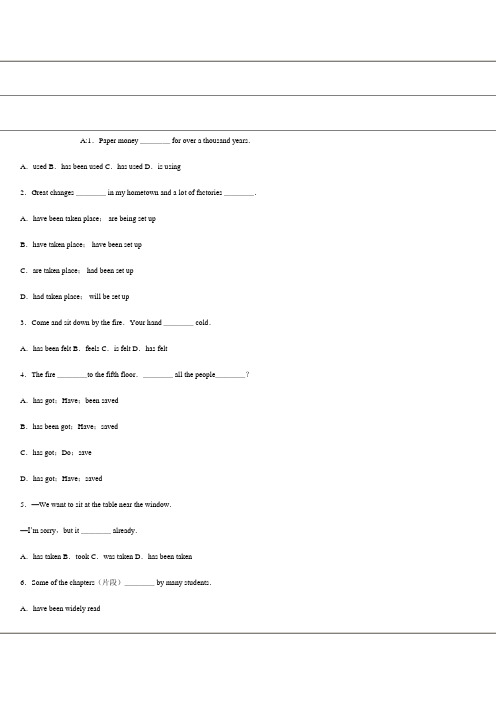
A:1.Paper money ____ for over a thousand years.A.used B.has been used C.has used D.is using2.Great changes ____ in my hometown and a lot of factories ____.A.have been taken place; are being set upB.have taken place; have been set upC.are taken place; had been set upD.had taken place; will be set up3.Come and sit down by the fire.Your hand ____ cold.A.has been felt B.feels C.is felt D.has felt4.The fire ____to the fifth floor.____ all the people____?A.has got;Have;been savedB.has been got;Have;savedC.has got;Do;saveD.has got;Have;saved5.—We want to sit at the table near the window.—I’m sorry,but it ____ already.A.has taken B.took C.was taken D.has been taken6.Some of the chapters(片段)____ by many students.A.have been widely readB.have read widelyC.were wide readD.had been widely read7.Why don’t you go to the book store to buy some books?Many new books ___ there.A.have just broughtB.have just been broughtC.were just broughtD.are just brought8.Till now,three films ____ in that small village this month.A.have shown B.have been shown C.were shown D.will be shown9.Do you know the thief ____ by the police?A.has caught B.has been catching C.was caught D.has been caught10.My sister is working in the power plant that ___ for just one year.A.was used B.has been used C.is used D.has usedKey: 1-5 BBBAD 6-10 ABBDB动词的时态和语态专题动词的时态 --- 基本概念1. 一般现在时例句1 --- You’re drinking too much.--- Only at home. No one ___ me but you.A. is seeingB. has seenC. seesD. saw正确选项为C, 说话人此时指目前一个经常性的行为。
译林牛津版英语八年级下册 Unit 3 一般过去时与现在完成时区别专题与练习(有答案)

译林牛津版英语八年级下册Unit 3一般过去时与现在完成时区别专题与练习一、前言:初一下学期同学们学习了一般过去时态的相关知识,即将到来的初二上学期英语学习中,现在完成时是重要的学习内容。
本文通过对比一般过去时和现在完成时,对现在完成时进行初步讲解,希望使同学们读新学期的学习有所准备。
二、现在完成时1. 现在完成时的构成现在完成时是由助动词have (has)+动词的过去分词构成。
助动词说明该谓语是属于现在时范围。
它和主语的人称、数要保持一致。
过去分词是主要的谓语动词,说明句子的意义。
2. 现在完成时的用法现在完成时表示过去某时发生的行为对主语目前产生的影响。
即用过去发生的某个行为来说明现在的某种情况。
We are good friends.(现在的情况)I knew him in 1997.(过去的动作)We have known each other since 1997.(现在完成时把过去的动作和现在联系起来并着眼于现在)(1)表示动作发生在过去某个不确定的时间,但对现在留下了某种影响和结果。
常被just、already、yet 等副词修饰。
如:-Have you had lunch yet?-Yes, I have. I've just had it.你(已经)吃午饭了吗?我刚刚吃过。
(现在我不饿了)(2)表示从过去某一时刻开始一直持续到现在的动作或状态。
这个动作可能刚停止,可能仍然在进行。
常带有for和since等表示一段时间的状语。
如:He has taught here since 1981他自1981年就在这儿教书。
(可能还要继续教)I haven't seen her for four years.我有四年没见到她了。
(3)表示说话前发生过一次或多次的动作,现在成为一种经验,一般译为汉语“过”,常带有twice, ever,never, three times等时间状语。
2020年九年级中考复习英语语法《动词的时态》专题练附答案
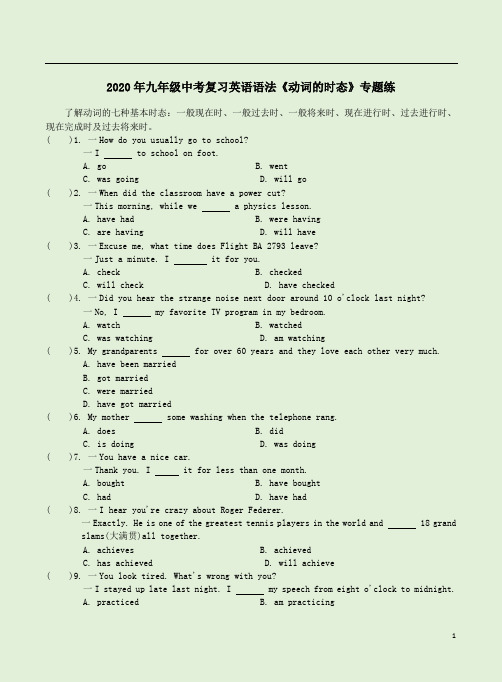
2020年九年级中考复习英语语法《动词的时态》专题练了解动词的七种基本时态:一般现在时、一般过去时、一般将来时、现在进行时、过去进行时、现在完成时及过去将来时。
( )1. 一How do you usually go to school?一I to school on foot.A. goB. wentC. was goingD. will go( )2. 一When did the classroom have a power cut?一This morning, while we a physics lesson.A. have hadB. were havingC. are havingD. will have( )3. 一Excuse me, what time does Flight BA 2793 leave?一Just a minute. I it for you.A. checkB. checkedC. will checkD. have checked( )4. 一Did you hear the strange noise next door around 10 o'clock last night?一No, I my favorite TV program in my bedroom.A. watchB. watchedC. was watchingD. am watching( )5. My grandparents for over 60 years and they love each other very much.A. have been marriedB. got marriedC. were marriedD. have got married( )6. My mother some washing when the telephone rang.A. doesB. didC. is doingD. was doing( )7. 一You have a nice car.一Thank you. I it for less than one month.A. boughtB. have boughtC. hadD. have had( )8. 一I hear you're crazy about Roger Federer.一Exactly. He is one of the greatest tennis players in the world and 18 grand slams(大满贯)all together.A. achievesB. achievedC. has achievedD. will achieve( )9. 一You look tired. What's wrong with you?一I stayed up late last night. I my speech from eight o'clock to midnight.A. practicedB. am practicingC. was practicingD. has practiced( )10. 一Do you know the Color Run, a five-kilometer race?一Yes. So far it into quite a few cities in our country.A. comesB. cameC. has come( )11. The house belongs to Mr. Smith, but he here any more.A. hasn't livedB. didn't liveC. wasn't livingD. doesn't live( )12. 一Lily, where is my dog?一Look! It under the bed.A. sleptB. was sleepingC. is sleepingD. will sleep( )13. Simon looks worried because he a writing competition and now he's waiting for the result.A. entersB. enteredC. will enterD. is entering( )14. 一What's the matter, Jack?一I down while I on the ice. I got hurt badly.A. was falling; skatedB. fell; was skatingC. fell; skatedD. was falling; skating( )15. 一Where's your brother?一Oh, he the library and .A. has been to; so Lucy isB. has gone to; so Lucy hasC. has gone to; so has LucyD. has been in; so has Lucy( )16. 一Look! Your teacher Miss White is over there.一No, it can't be her. She to Beijing.A. has goneB. has beenC. wentD. will go( )17. The earth is a planet and it around the sun.A. goesB. goC. will goD. went( )18. When you me last night, I the piano.A. were calling; was playingB. were calling; playedC. called; playedD. called; was playing( )19. 一Did you watch the football match on TV last night?一I wanted to, but my father his favorite TV program.A. watchedB. watchesC. was watchingD. had watched( )20. 一I wonder if Tom this afternoon.一Don't worry. I will tell you as soon as he .A. will come; comesB. comes; will comeC. comes; comes( )21. I've just returned from my trip to London. I many interesting places there.A. visitB. will visitC. am visitingD. visited( )22. Since we began to use the Internet, our lives a lot.A. changeB. had changedC. will changeD. have changed( )23. With the development of science and technology, robot cooks in our families in the future.A. appearB. appearedC. will appearD. is appearing( )24. A little effort every day, and you a big difference.A. makesB. madeC. have madeD. will make( )25. 一Look at my new smartphone.一Wow, it's so cool. When and where you it?A. do; buyB. have; bougtacC. did; buyD. have; had( )26. 一I saw Mr. Smith in the office at ten yesterday morning.一That's impossible. He an English party with us then.A. hasB. hadC. was havingD. has had( )27.一Can you tell me when you are going to arrive there?一I'm not sure. But I'll ring you up as soon as I there tomorrow.A. arriveB. arrivedC. will arriveD. am going to arrive ( )28. Lily is my classmate. We each other since she came to our school.A. knowB. knewC. have knownD. will know( )29.一Oh, my God! I you were in Beijing, too! When did you come?一I have lived in Beijing since 2015.A. don't knowB. didn't knowC. haven't knownD. wasn't known( )30. John and I to visit his grandparents last Sunday afternoonA. goB. wentC. will goD. have gone( )31. 一Where were Bill and David when the teacher came in?一They in the hallway.A. are talkingB. have talkedC. were talkingD. talk( )32. Don't make any noise, because the baby in the next room.A. is sleepingB. sleepsC. will sleepD. was sleeping( )33. 一Look out! Something down from the building.一Dear me! It's too dangerous.A. fellB. fallsC. is falling( )34. 一I wonder if our foreign teacher Mr. White to his hometown next Tuesday.一I'm not sure. But if he returns to his hometown, I him off.A. returns; seeB. will return; seeC. will return; will see ( )35. 一Where is your uncle, Jane?一He is in Guangzhou. He for a month.A. has leftB. has goneC. leftD. has been away( )36. 一Linda is not coming for the party tonight.一But she !A. promisesB. promisedC. will promiseD. had promised( )37. 一How many children do most post-80s' families have?一One. They two in the future, I guess.A. will haveB. hadC. haveD. have had( )38. 一Hey, Kate. I called you at 6: 30 yesterday evening, but you didn't answer.一Oh sorry. I at that time.A. am doing the dishesB. do the dishesC. was doing the dishes( )39. His grandmother for 6 years. But he still misses her very much.A. diedB. has diedC. has been deadD. has been died( )40. 一Paul, I'm busy cooking. Can you give me a hand?一Just a minute. I my e- mail.A. am checkingB. will checkC. have checkedD. was checking( )41. I don't know when he back. Please tell me when he back.A. comes; comesB. comes; will comeC. will come; comes( )42. 一I want to know if he back tomorrow.一I'll call you as soon as he .A. will come; will returnB. will come; returnsC. comes; will return( )43. (2017·凉山)一Last night I went to a concert of Chinese folk music. Erquan Yingyue was sosad but beautiful that I sensed a strong sadness and pain under the beauty.一So it was. The musician who played it last night to play the erhu since hevery young.A. learned; wasB. has learned; amC. has learned; wasD. learned; has been( )44. Several journalists the lawyer about the international case an hour ago.A. interviewB. interviewedC. will interviewD. had interviewed( )45. Even if you learn something well, you it unless you use it.A. forgetB. forgotC. have forgottenD. will forget( )46. He said he to join the basketball club.A. wantsB. is wantingC. wantedD. has wanted( )47. Lin Tao isn't here now. He to Qingdao.A. goesB. wentC. has beenD. has gone( )48.一I wonder if it tomorrow.一Don't worry. If it ,we'll stay at home.A. rains; rainsB. will rain; rainsC. rains; will rainD. will rain; will rain( )49. 一Can I speak to Mrs. Thomson?一Hold on please. She dishes in the kitchen.A. washesB. has washedC. washedD. is washing( )50. Mr. Liu waiting here for about five minutes.A. has beenB. has comeC. cameD. arrived( )51. If it doesn't rain this weekend, we a picnic in the Jinquan Park.A. haveB. will haveC. have hadD. had( )52. 一Did you do anything interesting last Sunday?一Not really. I just at home.A. stayB. stayedC. will stayD. am staying( )53. 一 Where is your mother, Tom?一She the flowers in the garden.A. watersB. is wateringC. wateredD. has watered( )54. Look on the bright side of life, and imagine that you a happy and successful future.A. hadB. will haveC. haveD. have had( )55. It's nice to see you again. We each other since 2016.A. won't seeB. haven't seenC. don't seeD. didn't see( )56. Please be quiet! The students an exam.A. takeB. are takingC. tookD. were taking( )57. 一Did you watch Running Man last night? It was so exciring.一No. I with my grandpa then.A. have talkedB. am talkingC. was talkingD. talked( )58. 一I want to know if your pen pal tomorrow.一If she tomorrow, we'll give her a big surprise.A. will come; will comeB. will come; comeC. will come; comesD. comes; will come( )59. 一What were you doing at nine o'clock last night?一 .A. I take a showerB. I took a showerC. I was taking a showerD. I am taking a shower( )60. My good friend, Lily, to see me next month.A. cameB. comeC. comesD. will come( )61. 一She to anyone for 2 days.一What happened to her?A. didn't speakB. hasn't spokenC. doesn't speakD. haven't spoken( )62. 一It's very dangerous to swim in the pool. Look at the sign.一Oh, I notice it. Thanks for telling me.A. won'tB. don'tC. haven'tD. didn't( )63. Wow! You dinner! Let's eat now.A. cookB. are cookingC. will cookD. have cooked( )64. She wasn't happy because she the concert given by her favorite singer.A. missesB. missedC. will missD. is missing( )65. Betty hard since last term. That's why her exam results are so good!A. has workedB. will workC. workedD. was working( )66. Don't take the dictionary away. I it.A. useB. usedC. am usingD. have used( )67. I'll lend you the storybook as soon as I it.A. will finish readingB. will finish to readC. finish readingD. finish to read( )68. 一Did you hear someone knock at the door just now?一Sorry. I to my friend on the phone.A. was talkingB. talkedC. am talking( )69. 一I'm sorry for being late.一Never mind. The meeting for only 5 minutes. This way, please.A. has begunB. has endedC. has been on( )70. I in the city since I left school.A. liveB. will liveC. was livingD. have lived( )71. I am surprised at the new look of my hometown for it a lot over the years.A. changedB. changesC. will changeD. has changed( )72. Some of my classmates an English play at the art festival two days ago.A. haveB. hadC. has( )73. 一Hello, John. This is Mike. What are you doing now?一I'm watching a football match. It started at 7:30 p. m, and on for another onehour.A. has beenB. wasC. will be参考答案1-10 ABCCADDCCC 11-20 DCBBCAADCA 21-30 DDCDCCACBB31-40 CACCDBACCA 41-50 CBCBDCDBDA 51-60 BBBBBBCCCD61-70 BDDBACCACD 71-73 DBC。
初二现在完成时、反义疑问句、过去进行时、不定式专题练习
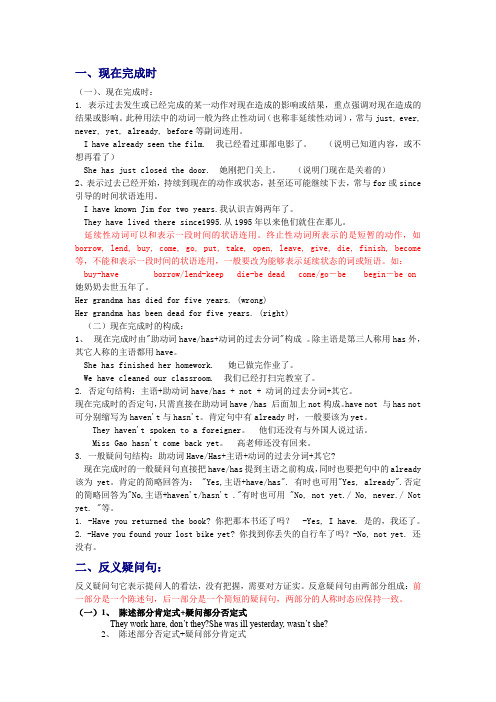
一、现在完成时(一)、现在完成时:1. 表示过去发生或已经完成的某一动作对现在造成的影响或结果,重点强调对现在造成的结果或影响。
此种用法中的动词一般为终止性动词(也称非延续性动词),常与just, ever, never, yet, already, before等副词连用。
I have already seen the film. 我已经看过那部电影了。
(说明已知道内容,或不想再看了)She has just closed the door. 她刚把门关上。
(说明门现在是关着的)2、表示过去已经开始,持续到现在的动作或状态,甚至还可能继续下去,常与for或since 引导的时间状语连用。
I have known Jim for two years.我认识吉姆两年了。
They have lived there since1995.从1995年以来他们就住在那儿。
延续性动词可以和表示一段时间的状语连用。
终止性动词所表示的是短暂的动作,如borrow, lend, buy, come, go, put, take, open, leave, give, die, finish, become 等,不能和表示一段时间的状语连用,一般要改为能够表示延续状态的词或短语。
如:buy-have borrow/lend-keep die-be dead come/go-be begin-be on 她奶奶去世五年了。
Her grandma has died for five years. (wrong)Her grandma has been dead for five years. (right)(二)现在完成时的构成:1、现在完成时由"助动词have/has+动词的过去分词"构成。
除主语是第三人称用has外,其它人称的主语都用have。
She has finished her homework. 她已做完作业了。
英语基本种时态专题练习
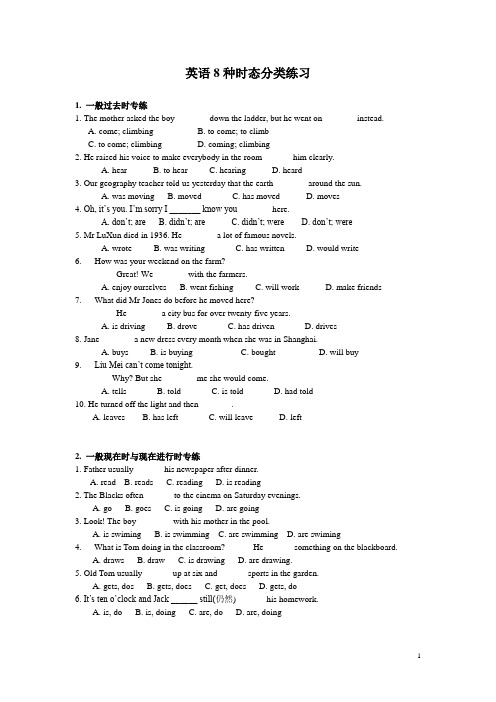
英语8种时态分类练习1. 一般过去时专练1. The mother asked the boy _______ down the ladder, but he went on _______ instead.A. come; climbingB. to come; to climbC. to come; climbingD. coming; climbing2. He raised his voice to make everybody in the room ______ him clearly.A. hearB. to hearC. hearingD. heard3. Our geography teacher told us yesterday that the earth _______ around the sun.A. was movingB. movedC. has movedD. moves4. Oh, it’s you. I’m sorry I _______ know you _______ here.A. don’t; areB. didn’t; areC. didn’t; wereD. don’t; were5. Mr LuXun died in 1936. He _______ a lot of famous novels.A. wroteB. was writingC. has writtenD. would write6. --- How was your weekend on the farm?--- Great! We _______ with the farmers.A. enjoy ourselvesB. went fishingC. will workD. make friends7. --- What did Mr Jones do before he moved here?--- He _______ a city bus for over twenty-five years.A. is drivingB. droveC. has drivenD. drives8. Jane _______ a new dress every month when she was in Shanghai.A. buysB. is buyingC. boughtD. will buy9. --- Liu Mei can’t come tonight.--- Why? But she _______ me she would come.A. tellsB. toldC. is toldD. had told10. He turned off the light and then _______.A. leavesB. has leftC. will leaveD. left2. 一般现在时与现在进行时专练1. Father usually ______ his newspaper after dinner.A. readB. readsC. readingD. is reading2. The Blacks often ______ to the cinema on Saturday evenings.A. goB. goesC. is goingD. are going3. Look! The boy ______ with his mother in the pool.A. is swimingB. is swimmingC. are swimmingD. are swiming4. --- What is Tom doing in the classroom? --- He ______ something on the blackboard.A. drawsB. drawC. is drawingD. are drawing.5. Old Tom usually ______ up at six and ______ sports in the garden.A. gets, dosB. gets, doesC. get, doesD. gets, do6. It’s ten o’clock and Jack ______ still(仍然) ______ his homework.A. is, doB. is, doingC. are, doD. are, doing7. The waiters ______ to work at five every morning.A. startB. startsC. startingD. are starting8. I ______ a letter, so I can’t go ou t with you.A. is writingB. am writingC. am writeingD. am writting9.A hundred days _____ quite a long time.A. isB. areC. haveD. has10. My mother _____ noodles, but my father ______.A. likes, doesn’tB. don’t like, doC. likes, didn’tD. didn’t like, do11. The picture ______ nice.A. looksB. is lookedC. lookD. is looking12. The students will go to the Summer Palace if it ______ tomorrow.A. don’t rainB. doesn’t rainC. won’t rainD. isn’t rain13. We are always ready _______ others.A. to helpingB. to helpC. helpD. helping14. I often hear her ______ about the boy.A. talkingB. talkC. to talkD. talked15. He’s already a little weak in Chinese, ______ he ?A. isB. isn’tC. hasD. hasn’t16 .Potatoes are ______ in the field by the farmers.A. growB. growingC. grownD. grew17. Does she have a watch? – Yes, she ______.A. haveB. doC. hasD. does18. Does your mother ______ English now?A. teachesB. teachC. taughtD. is teaching19. The boy is too young, please ______ carefully.A. look after himB. look him afterC. look at himD. look him at20. --Where is Frank now? -- He ______ his bike in the yard.A. fixes upB. fixing upC. is fixing upD. fixed21. Bob often ______ his mother with the housework on Sundays.A. helpB. helpingC. helpsD. helped22. The students will go to the Summer Palace if it ______ tomorrow.A. don’t rainB. doesn’t rainC. won’t rainD. isn’t rain23. If it _____ tomorrow, I will go by car.A. rainB. will rainC. rainsD. would rain24. My mother told us that Taiwan ______ part of China.A. isB. areC. wasD. were25. The clothes ______very soft.A. are feltB. are feelingC. feelD. feels26. The supermarket is far from Mary’s house. So she _____ only once a week.A. goes shoppingB. has been thereC. was shoppingD. has gone there27. Don’t make so much noise. We _____ to the music.A. are listeningB. listenC. listenedD. have listened28. I’ll go swimming with you if I _____ free tomorrow.A. will beB. shall beC. amD. was3.一般将来时专练1. --- Can I go to Beijing for my holiday, Dad? --- You can when you _______ a bit older.A. will getB. getC. are gettingD. got2. If he _______harder, he will catch up with us soon.A. studyB. studiesC. will studyD. studied3. --- Don’t forget to ask him to write to me.--- I won’t. As soon as he _______, I’ll ask him to write to you.A. will comeB. cameC. comesD. is coming4. --- Jimmy is leaving for a holiday.--- Really? Where _______ he _______?A. has; goneB. will; goC. did; goD. would; go5. Frank _______ to see his grandma if he _______ free tomorrow.A. will come; will beB. comes; isC. will come; isD. comes; will be6. There _______ a talk on science in our school next Monday.A. will giveB. will beC. is going to giveD. is7. --- Shall we go shopping now?--- Sorry, I can’t. I _______ my shirts.A. washB. washesC. washedD. am washing8. I believe that those mountains _______ with trees in a few years’ time.A. are coveredB. will be coveredC. are coveringD. will cover9. It is said that about 400 cars _______ in the factory next month.A. were producedB. will produceC. are producedD. will be produced10. --- Come back home every month.--- I _______.A. willB. mustC. shouldD. can4.过去进行时专练1. While we __________ (wait) for the bus, a girl __________ (run) up to us.2. I __________ (telephone) a friend when Bob __________ (come) in.3. We __________ (test) the new machine when the electricity __________ (go) off.4. She __________ (not want) to stay in bed while the others ________________ (all, work) in the fields.5. While mother ________ (put) Cathy to bed, the door bell ________ (ring).6. As I __________ (walk) in the park, it __________ (begin) to rain.7. I _____ (have) my breakfast at half past six yesterday morning.8. Mary _____ (go) over her lessons from six to seven last night. John and peter ____(do) the same thing.9. Was your father at home yesterday evening? Yes, he was. He _____ (listen) to the radio.10. They _____(not make) a model ship when I saw him.11. _____ they ____ (have) a meeting at 4 yesterday afternoon?No, they _____ (clean) the classroom.12. One day, Edison _____ (wait) for a train to arrive, and suddenly a little boy ran to the track(轨道) to play.13. In a letter, john told us that he _____ (come) to china next month.14. When the bell rang, jenny _____ (wait) in her seat.15. She _____ (make) her dress the whole afternoon.5.现在完成时练习I. Fill in the blanks with the proper form.1. I____ already ____ (see) the film. I ________ (see) it last week.2. _____ he ____ (finish) his work today? Not yet.3. My father ____ just ____ (come) back from work. He is tired now.4. Where’s Li Ming ? He __________ (go) to the teacher’s office.5. I __________ (work) here since I ______ (move) here in 1999.6. So far I _______________(make) quite a few friends here.7. How long ________ the Wangs ______________(stay) here ? For two weeks.8. I ________ just ___________ (finish) my homework.9. He ________ (go) to school on foot every day.10.____ you ______ (find) your science book yet?11. If it ____ (be) fine tomorrow, I'll go with you.12. The students ____________ (read) English when the teacher came in.13. Look! The monkey __________ (climb) the tree.15. I've lost my pen. _________ you ________ (see) it anywhere?II. Choose the best answer.3. Jane has _____ to BeiJing. She will come back tomorrow.A. beenB. goneC. wentD. never been4. It is ten years _____ I last saw her.A. afterB. sinceC. forD. that5.--Who will go to the station to meet Lorry?--I will. I _____ her several times.A. metB. have metC. had metD. will meet6. --What a nice dress! How long _____ you _____ it?--Just 2 weeks.A. will, buyB. did, buyC. are, havingD. have, had7.--Do you know Lydia very well?--Yes, She and I _____ friends since we were very young.A. have madeB. have becomeC. have beenD. have turned8. The Smiths _______ in China for 8 years.A. has livedB. livedC. have beenD. live9. --Hello, this is Mr. Green speaking. Can I speak to Mr. Black?-- Sorry. He ______ the Bainiao Park.A. has been toB. has gone toC. went toD. will go to10. --____ you ever ____ to the US?-- Yes, twice.A. Have, goneB. Have, been C, Do, go D. were, going6.过去完成时练习题1. The police found that the house _______.A. has broken intoB. had broken intoC. has been broken intoD. had been broken into2. By the end of this century, we__ ours into a strong modern country.A. will buildB. had builtC. have builtD. will have built3. We _________the work by six yesterday evening.A. finishedB.would finishC. had finishedD. had been finished4. I _________to help you but couldn’t get here in time.A. wantB. had wantedC. have wantedD. was wanting5. Mrs. Wu told me that her sister___________.A. left about two hours beforeB. would leave about two hours beforeC. has left about two hours agoD. had left about two hours before6. When I reached home, my parents __________their supper.A. are havingB.have already hadC. have hadD. had already had7. It seems that the old man _________something important.A. has lostB. had lostC. lostD. would lose8. Did you see Xiao Li at the party? No, ______by the time I arrived.A. she’d leftB. she's leftC. She was leftD. she must leave()9. The job proved to be much more difficult than I______.A. expect B .expected C. would expect D. had expected10. We couldn’t catch up with the others because they _____too long before us.A. startedB. were starting C .have started D. had started11. She felt anxious about her son as she ________for quite a long time.A .haven't heard him B. hadn’t heard himC .haven‘t heard from him D. hadn’t heard from him12. By the time the speaker entered the hall, all the listeners_______.A. had seatedB. were seatedC. seatedD. were seating13. By the end of next July this building__________.A. will be finishedB. will have finishedC. will have been finishedD. had been finished14. By the time the war ____, most of the people had left.A. was beganB. was broken outC. broke outD. had been broken out15. That dinner was the most expensive meal we___.A. would haveB. have hadC. had never hadD. had ever had16. When Jack arrived he learned Mary ______for almost an hour.A. had goneB. had set ofC. had leftD. had been away7.过去将来时练习I. 选择填空1. Li Ming said he _____happy if Brian_____to China next month.A. as; comeB. was; would comeC. would be; cameD. will be; come2. Jenny said she _____her holiday in China.A. spentB. would spentC. was going to spentD. would spend3. —What did your son say in the letter?—He told me that he ______ the Disney World the next day.A. will visitB. has visitedC. is going to visitD. would visit4. I hoped Tina ______ to my birthday party on time the next Wednesday.A. to comeB. is comingC. will comeD. was coming5. Father said that he ______ me to Beijing the next year.A. tookB. would takeC. takesD. will take6. We were not sure whether they ______ more vegetables.A. are going to growB. were going to growC. will growD. have grown7. She ______ to work when the telephone rang.A. is goingB. will goC. was about to goD. is to goII. 用所给动词的适当形式填空1. Miss Zhang said she ________________(visit) the Great Wall next summer.2. She told him that she ___________________(not stay) here for long.3. I wasn’t sure whether Lucy______________(come) the next year.4. The scientists said the w orld’s population __________________ (slow) down in future.5. She said the bus __________________(leave) at five the next morning.6. I wasn't sure whether he ___________________(lend) me his book the next morning.7. He was fifty-six. In two years he __________________________(be) fifty-eight.8. Whenever she has time, she ____________________(help) them in their work.答案:一般过去时专练1-5 CABAC 6-10 BADCA 11-15 BBCBD一般现在时与现在进行时专练1-5BAACB 6-10BABAB 11-15AABBB 16-20 BCDBC21-25 BBBAC 26-30 CCBAC 31-35 AAABC 36-39 AACB一般将来时专练1-5 BBBCB 6-10 CBDBD 11-13 AAA二、1. were waiting; ran 2. was telephoning; came 3. jumped; was moving4. was testing; went5. didn’t want; were all working6. was putting; rang选择题。
动词的时态和语态专题练习

动词的时态和语态专题练习The document was prepared on January 2, 2021高中英语语法时态和语态一.动词的时态时态是谓语动词所表示的动作或情况发生时间的各种形式.英语动词有16种时态,但是常见的只有九种:一般现在时、一般过去时、一般将来时、现在进行时、过去进行时、现在完成时、过去完成时、过去将来时、现在完成进行时.(一)一般现在时do / does1.具体用法1 表示经常性或习惯性动作We always care for each other and help each other. 我们总是互相关心互相帮助.He goes to school every day.2)表示现在的特征或状态He is very happy.Do you sing ----A little.3)表示普遍真理Light travels faster than sound. 光速比声速快.Actions speak louder than words. 行动胜过言语.常与一般现在时态连用的词或短语主要有:often, usually, sometimes, every day, every morning/afternoon, on Sundays/weekends等等.I often go to the cinema on Sundays. 我经常星期天去看电影.He goes to work early every day. 他每天上班很早.二一般过去时 did1表示过去某一特定时间所发生的、可完成的动作或状态,常与表示确切过去时间的词、短语或从句连用.例如:We went to the pictures last night and saw a very interesting film.2表示过去习惯性动作.例如:He always went to class last.I used to do my homework in the library.三一般将来时 will / shall do1表示将来打算进行或期待发生的动作或状态.例如:I shall graduate next year.2一般将来时有时可以表示一种倾向或习惯性动作.如Crops will die without water.You won’t succeed without their support.3 几种替代形式:be going to +v在中广泛使用,表示准备做或将发生的事情.例如:I'm going to buy a house when we've saved enough money.be to +v表示计划安排要做的事,具有"必要"的强制性意义.例如:I am to play tennis this afternoon.be about to +v表示即将发生的事情.例如:He was about to start.be due to +v表示预先确定了的事, 必定发生的事.例如:The train is due to depart in ten minutes.5少数动词如:begin, come, leave, go, arrive, start, stop, return, open, close等的一般现在时可用来表示将来的动作.多用来表示按计划事先安排好即将发生的动作,句中通常还有一个表示将来的时间状语.例如:The meeting begins at seven.The train starts at nine in the morning.四现在进行时 is / are doing1)表示现在某时或某段时间内正在进行的动作.常与现在进行时连用的词组是now, right now,at the mother,for the time being,for the present, 或某个具体的时间几点钟.He is writing a letter now.She is visiting Beijing this week.2)有时用来代替一般现在时态,表示一个经常性动作或状态,这时是为了表示一种感情如赞叹,厌烦,满意,不满等He is always thinking of his work. 表示赞许The boy is always talking in class. 表示不满3 有时用来表示一个在最近按计划或安排要进行的动作这时多有一个表示未来的时间的状语We are leaving on Friday. 我们星期五动身.How many of you are coming to the party五现在完成时have / has done1现在完成时用来表示对目前状况仍有影响的,刚刚完成的动作常与yet,already,just连用,或者过去某一时刻发生的,持续到现在的情况常与for,since连用.例如:I have just finished my homework.Mary has been ill for three days.2常与现在完成时连用的时间状语有:since, for, during, over等引导出的短语;副词already, yet, just, ever, now, before, often, lately, recently等;状语词组this week morning, month, year, so far, up to now, many times, up to the present等.例如:So far, she hasn't enjoyed the summer vacation.There have been a lot of changes since 1978.3完成时态可用在下列结构中:This That, It is was the first second... time +定语从句;This That, It is was the only last + n +定语从句;This That, It is was +形容词最高级+ n +定语从句.如果主句的谓语动词是一般现在时,从句的谓语动词通常用现在完成时;如果主句谓语动词是一般过去时,从句谓语动词通常用过去完成时.例如:1This is one of the rarest questions that have ever been raised at such a meeting.2There was a knock at the door. It was the second time someone had interrupted me that evening.六过去进行时 was / were doing过去进行时表示一个过去的动作发生时或发生后,另一个过去的动作正在进行,或表示过去反复的习惯,常与always,continually,constantly等动词连用.例如:1We were discussing the matter when the headmaster entered.2Whenever I visited him, he was always writing at the desk.七过去完成时 had done1表示过去某时间前已经发生的动作或情况,这个过去的时间可以用by,before等介词短语或一个时间状语从句来表示;或者表示一个动作在另一个过去动作之前已经完成.例如:1We had just had our breakfast when Tom came in.2By the end of last year they had turned out 5, 000 bicycles.2动词expect, hope, mean, intend, plan, suppose, wish, want, desire等用过去完成时,表示过去的希望、预期、意图或愿望等没有实现.例如:I had meant to take a good holiday this year, but I wasn't able to get away.另外两种表示"过去想做而未做的事"的表达方式是:1was / were + to have done sth, 例如:We were to have come yesterday, but we couldn't.2intended expected, hope, meant, planned, supposed, wished, wanted, desired + to have done sth, 如:I meant to have told you about it, but I forgot to do so.3过去完成时常用于以下固定句型:1hardly, scarcely, barely + 过去完成时+ when + 过去时.例如:Hardly had I got on the bus when it started to move.2no sooner +过去完成时+ than +过去时.例如:No sooner had I gone out than he came to see me.3by the end of +过去时间,主句中谓语动词用过去完成时.例如:The experiment had been finished by 4 o'clock yesterday afternoon.八一般过去将来时1. 一般过去将来时的形式Should / would+ 动词原形was / were + 动词-ing形式2. 一般过去将来时常用于宾语从句中,其主语的谓语动词为过去时态,可表示从过去某时看来将要发生的事情,如:He said that he would speak at the meeting.He was sixty-eight. In two years he would be seventy.九现在完成进行时 has / have been doing现在完成进行时表示过去某一时刻之前开始的动作或状态一直延续到过去某一时刻.例如:I have been looking for my lost book for three days, but I still haven't found it.运用动词时态要注意的几个问题一在时间和条件等状语从句中不要用将来时态,如We’ll give him the book if he wants it.He decided to fight back if he was hit again.I’ll call you as soon as I’ve finished my work.二时态的一致时态的呼应,如We saw that the smoke was coming from a window.I didn’t know if she would come.He admitted that he had been on the march.不进行时态调整的情况:1从句说的是一种普遍真理,如:Long ago, people didn’t know the earth moves round the sun.2当从句的谓语改成过去时可能造成误会,如Did he say that the train leaves at 5:30三瞬间动词在完成时态中的使用,如:误:I have received her letter for three months.正:I received her letter three months ago.正:It is three months since I received her letter.四注意某些要求一定时态的句型was/ were doing sth. when …did sth.I was reading a book when the bell rangwas/were about to do sth. when … did sth.We were about to leave when the telephone rang.She was about to go out when it started to rain表示做事做了第几次或共几次,要用完成时态,如:It’s the first time I’ve seen her.We have been there three times.It is / has been… since…It is has been two weeks since I came here.She said it was five hours since she had finished her work.hardly…when…We had hardly got in the crops when it began to rain.Hardly had we got in the crops when it began to rain.no sooner…than…I had no sooner come into the room than the door was closed.No sooner had I come into the room than the door was closed.二.动词的语态语态也是动词的一种形式,英语有两种语态:主动语态和被动语态.主动语态表示主语是动作的执行者,而被动语态表示主语是动作的承受者.1We use electricity to run machines. 主动语态2Electricity is used to run machines. 被动语态1.不能用于被动语态的动词和短语1在英语中,不及物动词不能用于被动语态,但有些不及物动词包括短语容易引起误用.如:appear, belong, belong, die, escape, fall, happen, last, remain, succeed, occur, come true, take place, consist of.2某些表示状态或特征的及物动词,如:become, contain, cost, fit, have, resemble, suit也没有被动语态.2.被动语态的时态形式常用的被动语态有下表所列的几种时态形式.时间一般时进行时完成时现在 am asked am being askedis asked is being askedare asked are being asked过去 was be asked was being askedwere be asked were being asked将来 shall be asked shall have been asked will be asked will have been asked过去 should be asked should have been asked将来 would be asked would have been asked 3.短语动词的被动语态短语动词转换为被动语态时,通常被看作是一个动词,后面的介词或副词不能拆开或省略.例如:1So far no correct conclusion has arrived at.2All the rubbish should be got rid of.4."get + -ed分词"的被动语态"get + -ed分词"结构强调动作的结果,而非动作本身,常用来表示突发性的,出乎意料的偶然事件.例如:The boy got hurt on his way home from work.另外,"get + -ed分词"还可用于谈论为自己做的事,是主动的行为而不是被动的行为.例如:get dressed穿衣服 get divorced离婚get engaged订婚get confused迷惑不解get lost迷路get washed洗脸get married结婚5.被动语态与系表结构的区别1The novel was well written.系表结构2The novel was written by Diskens.被动语态6.不能用于被动语态的及物动词,如:have, fit, hold, lack, cost…I have a computer.The hall can hold 200 people.7. 主动性式表被动意义①当feel、look、smell、taste、sound等后面接形容词时;当cut、read、sell、wear、write等词带状语修饰语时;当动词表示“开始、结束、关、停、转、启动”等意义时.This kind of cloth washes easily.这种布易洗.These novels won’t sell well.这些小说不畅销.My pen writes smoothly.我的钢笔写起来很流畅.The door won’t lock.门锁不上.The fish smells good.鱼闻起来香.②当break out、take place、shut off、turn off、work out等动词表示“发生、关闭、制定”等意思时.The plan worked out successfully.The lamps on the wall turn off.③want, require, need后面的动名词用主动表示被动含义.④be worth doing用主动形式表示被动含义.⑤在“be + 形容词+ to do”中,不定式的逻辑宾语是句子的主语,用主动代被动.This kind of water isn’t fit to drink.The girl isn’t easy to get along with.另外:be to blame受谴责,be to rent出租也用主动形式表被动.Choose the right answer1. They _____ friends since they met in Shanghai.A. have madeB. have becomeC. have beenD. have had2. The secretary is going to report to the manager as soon as he ______.A. will arriveB. arrivesC. is going to arriveD. is arriving3. We all know that ice ______.A. feel coldB. is felt soldC. is feeling coldD. feels cold4. ---This cloth _____ well and _____ long.--- OK. I’ll take it.A. washes ; lastsB. is washed; lastedC. washes, is lastedD. is washing, lasting5. Helen _____ her key in the office so she had to wait until her husband_____ home.A. has left; comesB. left; had comeC. had left; cameD. had left; would come6. It _____ every day so far this week.A. is rainingB. rainedC. rainsD. has been raining7. --- Are you going to the movies tonight--- Yes, I ______ my work by that time.A. will finishB. finishC. am going to finishD. will have finished8. --- Was the driving pleasant when you vacationed in Mexico last summer--- No, it _____ for four days when we arrived, so the roads were very muddy.A. was rainingB. would be rainingC. had been rainingD. has rained9. You won’t know if the coat fits you until you _____ it on.A. will tryB. are tryingC. triedD. have tried10. My dictionary _______, I have looked for it everywhere but still _______.A. has lost; don’t findB. is missing; don’t findC. has lost; haven’t foundD. is missing; haven’t found11. --- How long ______ each other before they _____ married--- For about a year.A. have they known; getB. did they know; were going to getC. do they know; are going to getD. had they known; got12. --- Come in, Peter, I want to show you something.--- Oh, how nice of you. I _____ you _____ to bring me a gift.A. never think; are goingB. never thought; were goingC. didn’t think; are goingD. hadn’t thought; were going13. When Jack arrived he learned Mary _______ for almost an hour.A. had goneB. had set offC. had leftD. had been away14 --- I’m sorry to keep you waiting.--- Oh, not at all. I ______ here only a few minutes.A. have beenB. had beenC. wasD. will15. The police found that the house _______ and s lot of things ______.A. has broken into; has been stolenB. had broken into; had beenstolenC. has been broken into; stolenD. had been broken into; stolen16. --- Have you moved into the house--- Not yet. The rooms ________.A. are being paintedB. are paintingC. are paintedD. are beingpainting17. If the city noises _______ from increasing, people ______ shout to be heard at the dinner table 20 years from now.A. are not kept ; will have toB. are not kept; have toC. do not keep; will have toD. do not keep, have to18. --- ________ the sports meet might be put off.--- Yes, it all depends on the weather.A. I’ve been toldB. I’ve toldC. I’m toldD. I was told19. I don’t think Jim saw me; he ______ into space.A. just stared 凝视B. was just staringC. has just staredD. had just stared20. --- _______ my glasses--- Yes, I _______ them on your bed a minute ago.A. Do you see; sawB. Had you seen; have seenC. Have you seen; sawD. Would you see; saw21. --- We could have walked to the station; it was so near.--- Yes. A taxi _______ at all necessary.A. wasn’tB. hadn’t beenC. wouldn’t beD. won’t be22. --- Who is Jerry Cooper--- ______ I saw you shake hands with him at the meeting.A. Don’t you meet him yetB. Hadn’t you met him yetC. Didn’t you meet him yetD. Haven’t you met him yet23. --- Nancy is not coming tonight.--- But she _______A. promisesB. promisedC. will promiseD. had promised24. _______ it with me and I’ll see what I can do.A. When leftB. LeavingC. If you leaveD. Leave25. It is clear that his poor education _______ him back.A. has been heldB. is holdingC. will be heldD. had held26. --- How are you planning to travel to Shanghai--- I ____ yet, but I ______ taking a train.A. haven’t decided; am consideringB. haven’t decided, considerC. didn’t decided; am consideringD. hadn’t decided; haveconsidered27. The pen I _______ I _______ is on my desk, right under my nose.A. think, loseB. thought , had lostC. think , had lostD. thought, have lost28. --- Have you heard about the new school--- No, when and where to build the new one _______ yet.A. is not decidedB. are not decidedC. hasn’t decidedD. haven’t decided29. --- Sorry, I’m late.--- That’s OK. I _____ long.A. haven’t waitedB. don’t waitC. haven’t been waitingD.didn’t wait30. --- Nancy sat in the front seat on the left side of the classroom.--- Oh I thought she ______ in the back.A. will sitB. had satC. is sittingD. has sat31. I ______ my face when suddenly someone ______ at the door.A. washed, knockedB. washed, was knockingC. was washing, was knockingD. was washing, knocked32. I ______ at the station half an hour ago, but the train _____ yet.A. arrived, hadn’t comeB. was arriving, hadn’t comeC. arrive d, hasn’t comeD. had arrived, didn’t come33. --- Why did you come by taxi--- My car broke down last week and I still _______ it repaired.A. haven’t hadB. didn’t haveC. don’t haveD. won’t have34. I’m surprised to find you here looking well and playing tennis, Jim. Annsaid that you _____ sick.A. areB. wereC. would beD. had been35. The price _________, but I doubt whether it will remain so.A. went downB. will go downC. has gone doneD. was going down36. --- Did you go to Qingdao for vacation last August--- I _______ to go, but I got sick at the last minute.A. was planningB. had been planningC. plannedD. have planned37. I finally got the job I dreamed about. Never in my life _____ so happy.A. did I feelB. I feltC. I had feltD. had I felt38. --- How are you today--- Oh, I ________ as ill as I do now for a very long time.A. didn’t feelB.wasn’t feelingC. don’t feelD. haven’t felt39. The reporter said the UFO ______ east to west when he saw it.A. was travellingB. travelledC. had been travellingD. was totravel40. --- I think that you need ______ practice on playing the violin.--- ______ violin lessons every two weeks, but I think I’ll make it every week from now on.A. less; I haveB. less; I’ve takingC. more; I haveD. more; I’ve been having41. I remember ______ for the job, but I forget the exact number.A. to be paidB. being paidC. get paidD. that I receive pay42. By this time you come, I ______ the task ______ to me last month.A. have finished, givenB. will have finished, to be givenC. will have finished, givenD. have finished, to be given43. There was a knock at the door. It was the second time that someone ______ me that evening.A. to have interruptedB. would have interruptedC. had interruptedD. to interrupt44. ---- It is a long time ______ I saw you last.---- Yes. And it will be a long time ______ we see each other again.A. before, sinceB. since, beforeC. then, thenD. when, when45. We ______ that you would be able to visit us, but you did not.A. hopeB. hopedC. had hopedD. are hoping46. Mary felt both unprepared and nervous about the interview which she______ the next day.A. was bout to faceB. is going to faceC. will faceD. was to face47. In such dry weather, the flowers will have to be watered if they ______.A. have survivedB. are to surviveC. would surviveD. will survive48. ---- Are you member of the club---- ______. It’s ten years since I ______ a member of the club., was B. No, became C. Yes, had been D. No, was49. She ______ law the moment she has finished high school.A. is going to studyB. is to studyC. is about to studyD. will be studying50. The bikes produced in that factory are of high quality. So they ______ well both at home and abroad.A. sellB. are soldC. may be soldD. are to be sold。
中考英语专题复习现在完成时人教新目标版

中考英语专题复习现在完成时⼈教新⽬标版中考英语专题复习现在完成时,过去完成时的选择题1.We have been friends _____ over 20 years.A.sinceB.forC.inD.with2.We have been each other _____ we wre five years old.A.forB.inC.sinceD.until3.—how long have you lived in Beijing?---_____.A.Two and a half yearB.Two year and a halfC.Two years and a halfD.Half and two years4. Hanmei_____ in this school since 2009.She knows every teacher here.A.will studyB. studiesC.studiedD. has studied5.My brother has _____ come here, but my sister hasn’t _____.A. already, alreadyB. already, yertC.yet, alreadyD.yet, yet6.---Where is the librarian?---She _____ to the bookshop.A.wentB.has goneC. goesD.will go7. ---I _____ to the beautiful beach in Hainan.---That’s wonderful. But I _____ there.A. have gone, have never goneB.have been, have never beenC.have been, have never goneD.have gone, have never been8.Hery speaks Chinese very well. He _____ in China since 2002.A. staysB.stayedC.is stayingD.has stayed9. ---_____ you _____ it for two weeks.---Yes, I _____ it for two weeks.A. Have, borrowed, have keptB. Have, borrowed, have borrowedC. Did, borrowed, borrowedD. Did, borrowed, have kept10. He_____ in Ningxia since 1958.A.is B,was C.lives D.has been11.By the time I got to the bus stop, the bus _____ already _____.A. have,left B had. leave C. had, left D. has, left12. These people _____ at the hotel before 8 o’clock last night.A. arrived B have arrived C. had arrived D. would have13. After they _____ cleaning the classroom, they _____ home yesterday.A.finished,wentB.had finished, wentC. fininshed ,had goneD.had finished,had finished14. It was the third time that she _____ the Itistory Museum.A,had visited B.has visited C.will visit Dvisited15. She said she _____ me five letters in one month.A.has written B,will write C.had wtitten D.wrote]⼆、⽤所给词以适当形式填空1. ---Have you _____(find) your knife yet?---Not yet.2. ---_____you _____ ( write) a letter to your aunt yet?3.______you ever _____ (lose)your keys?4.When I got there , they _____(begin) the meeting.5.So far, I _____(learn) about two thousand English words.6.Anna didn’t want to come to the cinema with us because she _____ already _____ (see) the film.7.I went to bed early because I _____(finish) my homework yesterday.8.You can’t find him. He _____(go) to town.9.Wangli _____(join) the League in 199. She _____(be) a League member for about 11 years.10.Since she _____(move) here, she _____(be) a teacher for five years.三、句型转换1. Linda came to China five years ago.(改为同义句)Linda _____ been _____ China for five years.2. Mike’s grand father has been dead for five years. (改为同义句)It’s five years _____ Mile’s grandfather _____.3. He’s already done well in Chinese. (改为⼀般疑问句)_____ he _____ well in Chinese _____?4. The bus had left by the time we got there. (改为同义句)The bus had left_____we got there.5. He has been to Beijing. He told me.(合并为⼀句)He told me that he _____ ______ to Beijing.6. Mr.Smitn has finished his work already.(改为疑问句)_____ Mr. Smith finished his work _____?7. They have never been to an English—speaking county.(变为⼀般疑问句)_____ they _____ been to an English—speaking country.8. She’s already gone to England.(改为否定句)She _____ _____ to England _____.9. I have been to shanghai. (改为⼀般疑问句)_____ you _____ to shanghai?10. My parents moved to shanghai in 2007, and they still live there.(改为同义句) My parents _____ _____ _____ shanghai _____ 2007.现在完成时与⼀般过去时的区别1.相同点:都可以表⽰过去做的动作。
英语语法-现在完成时与一般过去时的区别(附习题)

英语语法| 现在完成时与一般过去时的区别(附习题)共同点:现在完成时和一般过去时都表示一个在过去完成的动作。
区别:①现在完成时强调的是与现在的关系,如对现在产生的结果或影响等,属于现在时范围,谈论的是现在的情况。
而一般过去时只表示动作在过去某一时刻发生,不表示和现在的关系,现在情况可能已发生变化。
Who opened the door?“谁开的门?”(只强调过去开门这一动作,门现在可能已关上。
)Who has opened the door?“谁把门开了?”(强调门现在依然还开着。
)②现在完成时不能与明确的过去时间状语连用,如:three days ago, last year, yesterday, last Sunday, in 2008等等。
如句中有以上这些明确的过去时间状语,应用一般过去时。
再有,过去发生的一个动作,如现在情况已经发生的变化,也应用一般过去时。
特别提醒:如果这些过去时间状语前有since,表示“自过去某一时间一直延续到现在”,应用现在完成时。
He finished reading the book the day before yesterday.他前天读完了这本书。
I put my ruler in my pencil-box, but I can’t find it now.我把尺子放到文具盒里了,但是我现在找不它了。
My cousin has been in Nanjing since 2009.我的表弟从2009年起就呆在南京了。
③现在完成时不与when引导的特殊疑问句连用,when后只用一般过去时表示已发生的动作。
但现在完成时可与where, why等疑问词连用。
如:Where have you been?你去过哪里了?—The train has left.—When did the train leave?——火车已经驶离了。
——火车什么时候驶离的?④since引导的时间状语从句后面用一般过去时,只有前面的主句才用现在完成时。
专题一 谓语动词的时态——2022届新高考英语一轮复习

主要知识点
01 谓语动词的时态 02 动词的时态解题技巧
03 易混时态的区别
1、谓语动词的时态
重点考点:一般现在时;一般过去时;现在完成时
1.一般现在时
(1)构成: ①第一、二人称的一般现在时通常用动词原形表示,第三人称单 数,则一般在动词原形后加-s或-es, 其变化规则如下表所示:
】 said they would let me know as soon as they got there. 他们说
他们一到那儿就会马上通知我。 般过去时常用的时间状语有yesterday,last week,an hour ago, her day,in 1982等。 】 She suddenly fell ill yesterday. 昨天她突然病倒了。
If you don't hurry, you will miss the train. 如果你不快点儿,你就会赶不上火车。
• 表示事物的固有属性或必然趋势; 【例】 Fish will die without water. 离开水,鱼就会死。 • 表示偶然的、临时的决定。 【例】 -Do you know Mr. Smith has come to our town? -No. I will go and visit him right now. -你知道史密斯先生来我们镇了吗?
练习:
1.He
(seek) to cheat in the exam the other day but in
vain.
2.The girl in the wheelchair ________(weep) with frustration
when she could not get up the stairs.
高考英语总复习时态专题学案
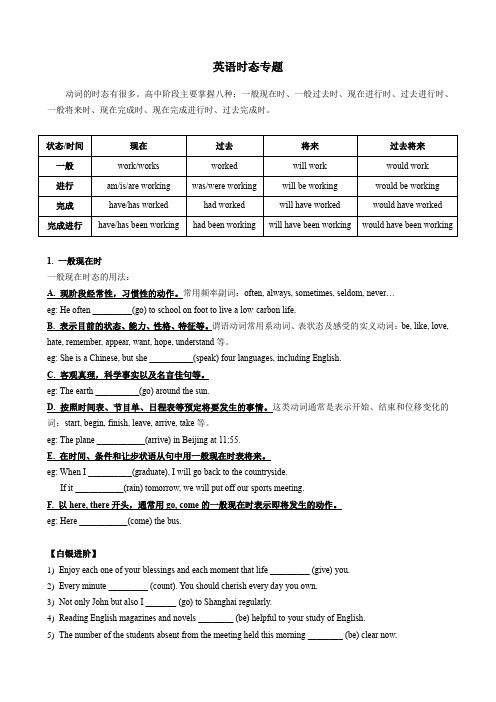
英语时态专题动词的时态有很多。
高中阶段主要掌握八种:一般现在时、一般过去时、现在进行时、过去进行时、一般将来时、现在完成时、现在完成进行时、过去完成时。
1. 一般现在时一般现在时态的用法:A. 现阶段经常性,习惯性的动作。
常用频率副词:often, always, sometimes, seldom, never…eg: He often _________(go) to school on foot to live a low-carbon life.B. 表示目前的状态、能力、性格、特征等。
谓语动词常用系动词、表状态及感受的实义动词:be, like, love, hate, remember, appear, want, hope, understand等。
eg: She is a Chinese, but she __________(speak) four languages, including English.C. 客观真理,科学事实以及名言佳句等。
eg: The earth __________(go) around the sun.D. 按照时间表、节目单、日程表等预定将要发生的事情。
这类动词通常是表示开始、结束和位移变化的词:start, begin, finish, leave, arrive, take等。
eg: The plane ___________(arrive) in Beijing at 11:55.E. 在时间、条件和让步状语从句中用一般现在时表将来。
eg: When I __________(graduate), I will go back to the countryside.If it ___________(rain) tomorrow, we will put off our sports meeting.F. 以here, there开头,通常用go, come的一般现在时表示即将发生的动作。
- 1、下载文档前请自行甄别文档内容的完整性,平台不提供额外的编辑、内容补充、找答案等附加服务。
- 2、"仅部分预览"的文档,不可在线预览部分如存在完整性等问题,可反馈申请退款(可完整预览的文档不适用该条件!)。
- 3、如文档侵犯您的权益,请联系客服反馈,我们会尽快为您处理(人工客服工作时间:9:00-18:30)。
一般过去时与现在完成时区别专题与练习一、前言:初一下学期同学们学习了一般过去时态的相关知识,即将到来的初二上学期英语学习中,现在完成时是重要的学习内容。
本文通过对比一般过去时和现在完成时,对现在完成时进行初步讲解,希望使同学们读新学期的学习有所准备。
二、现在完成时1. 现在完成时的构成现在完成时是由助动词have (has)+动词的过去分词构成。
助动词说明该谓语是属于现在时范围。
它和主语的人称、数要保持一致。
过去分词是主要的谓语动词,说明句子的意义。
2. 现在完成时的用法现在完成时表示过去某时发生的行为对主语目前产生的影响。
即用过去发生的某个行为来说明现在的某种情况。
We are good friends.(现在的情况)I knew him in 1997.(过去的动作)We have known each other since 1997.(现在完成时把过去的动作和现在联系起来并着眼于现在)(1)表示动作发生在过去某个不确定的时间,但对现在留下了某种影响和结果。
常被just、already、yet 等副词修饰。
如:-Have you had lunch yet?-Yes, I have. I've just had it.你(已经)吃午饭了吗?我刚刚吃过。
(现在我不饿了)(2)表示从过去某一时刻开始一直持续到现在的动作或状态。
这个动作可能刚停止,可能仍然在进行。
常带有for和since等表示一段时间的状语。
如:He has taught here since 1981他自1981年就在这儿教书。
(可能还要继续教)I haven't seen her for four years.我有四年没见到她了。
(3)表示说话前发生过一次或多次的动作,现在成为一种经验,一般译为汉语“过”,常带有twice, ever,never, three times等时间状语。
如:I have been to Beijing twice.我去过北京二次。
3.现在完成时的时间状语(1)现在完成时属于现在时范围,故不能和过去的时间状语连用。
如:yesterday,last Sunday,in1990,three years ago等。
但是,在强调动作产生的后果和影响时,可以和一些表示不确定的时间状语连用。
a. 用副词already和yet。
already一般用于肯定句中,yet一般用于否定句和疑问句中。
如:We have already finished our homework.我们已完成作业了。
They haven't finished their homework yet.他们还没有完成作业。
b.用ever 和never。
多用于否定或疑问句中,表示“曾经”或“从未”等。
如:-Have you ever been to the Great Wall? 你曾经去过长城吗?-I have never been to the Great Wall.我从未去过长城。
c.用表示到说话为止的过去时间状语,如just, before, up to now, the past few years 等。
例如:I have seen her before, but I can not remember where.我以前见过她,但记不起在哪里见过。
He has been there three times the last few days.近几天他去过那里三次了。
d.用包括“现在”在内的时间状语,如:now, today, this morning (month, year, term)等。
例如:-Have you met him today? -No, I haven't.今天你见过他吗?我没有。
How many times have you been there this year?今年你去过那里多少次?(2)现在完成时可以和带有since或for等表示“一段时间”的状语连用,表示动作或状态从某一时刻开始,一直持续到现在。
如:I haven't seen him for two years. 但是,像come, arrive, buy等终止性动词不能与表示“一段时间”的状语连用。
要用,必须改为“be (在)”等延续性动词来表述。
现归纳总结一下由非延续性动词到延续性动词的转换:arrive →be here begin(start)→be ondie →be dead come back →be backleave →be away fall ill(sick, asleep)→be ill(sick, asleep)get up →be up go out →be outfinish →be over put on →wear 或be onopen →be open join →be in或be a member of…close →be closed go to school →be a studentborrow →keep buy →havecatch(a cold)→have(a cold)get to know →knowbegin to study →study come to work →work等如:He has been a soldier for three years.他参军三年了。
His father has been dead for two years.他父亲去世二年了。
The film has been on for ten minutes.电影已开始十分钟了。
We have studied English for three years. 我们(开始)学英语已三年了。
4.几点注意事项(1)have been(to)与have gone( to)的区别:have been(to)表示“去过某地(现在已经回来了)”,可用于各人称;have gone(to)表示“去某地了(说话时某人不在当地)”,常用于第三人称,前者可与once ,never, several times等连用,后者则不能。
如:They have been to Beijing twice.他们去过北京两次。
He has gone to Beijing . 他去北京了。
(2)如单纯表示一段时间,或强调一段时间,虽有since一词,也不必用完成时。
如:It is two years since his father died.=His father has been dead for two years.他父亲去世已有两年了。
(3)终止性动词现在完成时的否定式,已变成一种可以延续的状态,因此可以和表示一段时间的状语连用。
如:I haven't left here since 1997.自从1997年以来,我一直没有离开过这儿。
(4)表示行为或状态从过去一直持续到现在时,用现在完成时,要加表示一段时间的时间状语时,常用for+一段时间, since+时间点。
I have lived here since my childhood.我从小就一直住在这里。
I have lived here for 10 years. 我在这已经住了10年了。
(5) 在提问现在完成时的时间状语时通常用how longHow long have you lived here?注意:在表示某一行为状态持续多长时间时,根据终止时间的不同,时态使用是不一样的。
如:I lived here for a week last summer.去年夏天我在这里住了一周。
I have lived here for a week by now. 到现在为止,我已经在这里住了一周。
I will live here for a week next year.明年我会在这里住一周。
二、现在完成时与一般过去时的区别现在完成时用来表示之前已发生或完成的动作或状态,其结果的确和现在有联系。
动作或状态发生在过去,但它的影响现在还存在;而一般过去时表示过去的事实,不表示和现在的关系。
I have just been to London. I went there last month. 我刚去过伦敦,是上个月去的。
1. 过去时表示过去某时发生的动作或单纯叙述过去的事情,强调动作;现在完成时为过去发生的,强调过去的事情对现在的影响,强调的是影响。
2. 过去时常与具体的时间状语连用,而现在完成时通常与模糊的时间状语连用,或无时间状语。
一般过去时的时间状语:yesterday, last week,…ago, in1980, in October, just now, 具体的时间状语共同的时间状语:this morning, tonight, this April, now, once,before, already, recently,lately现在完成时的时间状语for, since, so far, ever, never, just, yet, till / until, up to now, in past years, always, 3.现在完成时可表示持续到现在的动作或状态,动词一般是延续性的,如live, teach, learn, work, study, know. 过去时常用的非持续性动词有come, go, leave, start, die, finish, become, get married等。
举例:I saw this film yesterday. (强调看的动作发生过了。
)I have seen this film. (强调对现在的影响,电影的内容已经知道了。
)Why did you get up so early? (强调起床的动作已发生过了。
)Who hasn't handed in his paper? (强调有卷子,可能为不公平竞争。
)She has returned from Paris. 她已从巴黎回来了。
She returned yesterday. 她是昨天回来了。
He has been in the League for three years. (在团内的状态可延续)He has been a League member for three years. (是团员的状态可持续)He joined the League three years ago. ( 三年前入团,joined为短暂行为。
)I have finished my homework now.---Will somebody go and get Dr. White?---He's already been sent for.句子中如有过去时的时间副词(如yesterday, last, week, in 1960)时,不能使用现在完成时,要用过去时。
